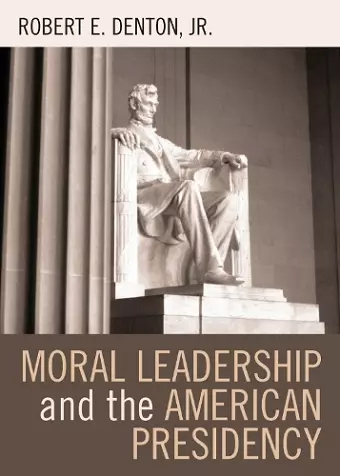Moral Leadership and the American Presidency
Format:Hardback
Publisher:Bloomsbury Publishing PLC
Published:1st Nov '05
Currently unavailable, and unfortunately no date known when it will be back

We have a crisis of leadership in America today. We are not electing the very best to public office, nor are the best willing to serve. As a nation, we have lowered our standards and expectations of those who run and their performance in office. Robert E. Denton, Jr.'s exceptional book explores moral presidential leadership, ultimately calling for a return to a 'heroic presidency.' Briefly surveying presidential character throughout our history, he gives an overview of the decline in trust of the government and offers possible reasons for this trend. Denton argues that personal character and integrity are essential and critical presidential traits. Focusing mainly on Bill Clinton and George W. Bush, he compares the scandal-filled terms of Clinton and Richard Nixon and looks at Bush vis-^-vis the elections, September 11, and the Iraq war. Denton addresses the myth of separating private from public behavior and shows how virtually everything presidents do or say influences their decisions and impacts citizens. Moral Leadership and the American Presidency is a must-read for anyone interested in the modern role of the president or in morality in American public life.
Political scientists and political communication scholars sometimes forget that the messenger is just as important as the message. Bob Denton has written a thoughtful book, demonstrating that ethos and character matter and that moral presidential leadership is essential for a healthy republic and vibrant democracy. His work harkens back to a presidency that Franklin D. Roosevelt called 'preeminently a place for moral leadership.' -- Henry C. Kenski, University of Arizona, coauthor of Attack Politics
Robert Denton has written a remarkable book. Using the prisms of contemporary American politics and political journalism, Denton has plumbed the depths of our present polarization. He finds the roots of that polarization are deeper than the empty careerism of office holders, the dominance of campaign managers or the machinations of a sensationalistic press. With incredible daring Denton plumbs the deep divisions in America?divisions between locals and cosmopolitans, between the secular and the devout, andbetween rural and urban perspectives. He finds that our present political rhetoric mobilizes and exaggerates these divisions. His book unmasks this rhetoric and documents its unhealthy effects. This book is passionate, fluent, powerful. Denton is clearly fed up with the kind of nonsense that passes for political analysis and the mean-spirited character assassination that passes for criticism. He has also abandoned the good-buddy language of advertising that characterizes so many contemporary books onpolitical culture. His book is blunt, built around a driving purpose. Reading it was like taking a shower in cold slivers of steel. -- Andrew A. King, Louisiana State University; editor of Postmodern Political Communication
Robert Denton has written a remarkable book. Using the prisms of contemporary American politics and political journalism, Denton has plumbed the depths of our present polarization. He finds the roots of that polarization are deeper than the empty careerism of office holders, the dominance of campaign managers or the machinations of a sensationalistic press. With incredible daring Denton plumbs the deep divisions in America—divisions between locals and cosmopolitans, between the secular and the devout, and between rural and urban perspectives. He finds that our present political rhetoric mobilizes and exaggerates these divisions. His book unmasks this rhetoric and documents its unhealthy effects.
This book is passionate, fluent, powerful. Denton is clearly fed up with the kind of nonsense that passes for political analysis and the mean-spirited character assassination that passes for criticism. He has also abandoned the good-buddy language of advertising that characterizes so many contemporary books on political culture. His book is blunt, built around a driving purpose. Reading it was like taking a shower in cold slivers of steel.
ISBN: 9780742539488
Dimensions: 221mm x 170mm x 18mm
Weight: 313g
160 pages